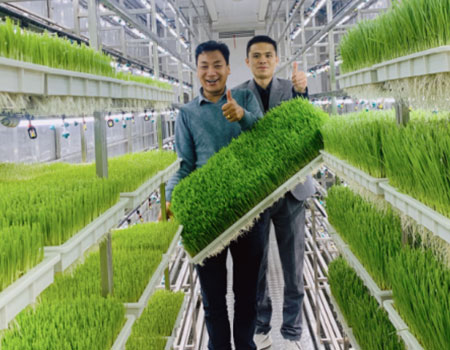In Lebanon, many are grown in greenhouses. So, do you grow in soil or in hydroponics? Traditional soil planting is used by many people, but due to climate reasons, hydroponics is more suitable for the development of local agriculture.
Hydroponic vegetables
When it comes to soilless cultivation, the first thing we think of is hydroponics. Hydroponics is carried out under a relatively controllable environment. The nutrient supply for crop growth and various environmental factors can be relatively precisely regulated. Therefore, hydroponics the yield and quality of cultivated vegetables are unmatched by traditional soil cultivation. Whether it is safety, vegetable taste, or internal quality, it is far superior to soil cultivation.
Because hydroponic vegetables have so many advantages, hydroponic vegetables are the best choice for high-grade and safe vegetable production in many countries. The superiority of hydroponic production technology has attracted more and more attention, especially leafy vegetables, with short production cycle, high yield and simple hydroponic technology, so hydroponic technology is the most widely used in the production of leafy vegetables.
Hydroponic greenhouse
Tomatoes, cucumbers, peppers and other crops can be grown in greenhouses. In Lebanon, Dutch buckets are generally used for planting in
greenhouses, because the drip irrigation technology of Dutch buckets can save water very much, which is very common in Lebanon. If you want a hydroponic system other than Dutch buckets, there are a few other hydroponic systems you can try.
Hydroponic NFT System
This is pipe-type planting, which can be planted in flat and A-frame NFT planting methods. Vertical planting will save space to the greatest extent. In the Middle East, many people use NFT systems for hydroponic planting in greenhouses. Various green leafy vegetables can be grown, the growth cycle is relatively short, the equipment is relatively easy to install and clean, the appearance is simple and elegant, and the investment cost is relatively low.
The A-frame cultivation structure is distributed in an A-shape, which is conducive to the lighting of hydroponic vegetables and greatly facilitates the daily operation of the seeders. The A-frame
NFT system has a flexible structure and can be reasonably matched according to different needs. Because the A-frame cultivation system is easy to operate and clean, it has become the most commonly used hydroponic equipment in hydroponic agriculture nowadays. Vegetables suitable for A-frame cultivation include lettuce, shallots, kale, strawberries, fungus and coriander, etc.
Vertical farming
In fact,
vertical farming is very popular in the Middle East. Vertical farming is the optimization of the way crops are grown. According to research, in terms of vegetable cultivation, the output of 1 square meter of vertical farming is equivalent to that of 50 square meters of traditional agriculture. Beyond that, vertical farming will also change the farm-to-fork supply chain model and reduce carbon footprints through adjacent production and shorter transport distances. About 40% of the world's agricultural products are lost on the way to major cities.
Another great advantage of vertical farming is that crops are available 365 days a year, regardless of weather and seasonal conditions. The hydroponic NFT system also takes advantage of this.
Which method would you choose for hydroponics? Welcome to learn more about hydroponics.





.jpg)



.jpg)
